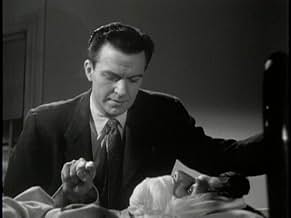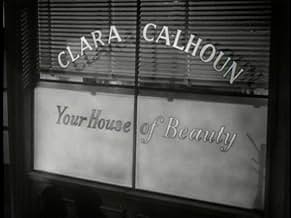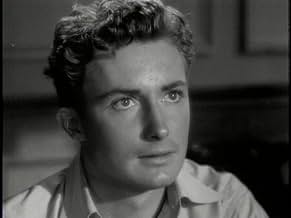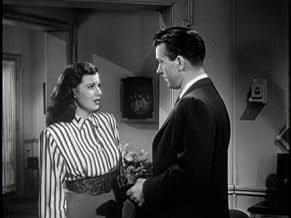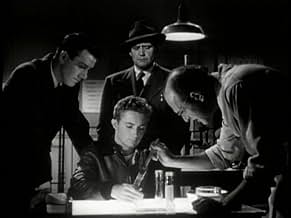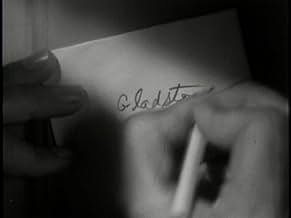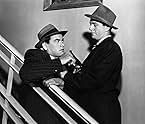IMDb RATING
6.6/10
1.9K
YOUR RATING
A beautician and her crooked boyfriend attempt to rob the bookie operation located in the back room, but when the plan goes wrong, they frame an innocent man.A beautician and her crooked boyfriend attempt to rob the bookie operation located in the back room, but when the plan goes wrong, they frame an innocent man.A beautician and her crooked boyfriend attempt to rob the bookie operation located in the back room, but when the plan goes wrong, they frame an innocent man.
Gordon B. Clarke
- Club Pianist
- (uncredited)
Ellen Corby
- Mrs. Wills
- (uncredited)
Kenneth Farrell
- Burns
- (uncredited)
Herschel Graham
- Nightclub Patron
- (uncredited)
Mira McKinney
- Beauty Salon Owner
- (uncredited)
Philip Morris
- Guard
- (uncredited)
Paul Power
- Nightclub Patron
- (uncredited)
- Director
- Writers
- All cast & crew
- Production, box office & more at IMDbPro
Featured reviews
John Ireland is a cold blooded and vile villain and Hugh Beaumont is an honest detective who's not so sure that he and his fellow overzealous cops have the right suspect (Ed Kelly) in the murder of a police officer in a gangland robbery. Toss in an evil cat fight between Sheila Ryan and Jane Randolph and "Railroaded!" becomes a prime example of Anthony Mann' superior post-war Film Noir direction. Using low lights and a suggestive script despite a low budget and grade "B" actors, Mann jumps right into the action from the start with a botched robbery that leads to not just the death of a cop, but the railroading of an innocent man. Mann builds the story up with tension and skill until the taught finale filled with gun shots, breaking glass, and confusing camera angles. It may be a "B" movie, but Mann deserves a "A" for his effort.
Anthony Mann directed some of the very best noirs of the 1940s and early 1950s.
This one is brutal, hard-hitting, and unrelenting till its Hollywood ended. (The ending may have been tacked on. I don't know. But it works organically with the whole, unlike many others.)
The problem for me with some of his movies, this one included, is that they are so dark they're almost impossible to see at times. Yes, it's atmospheric. But it's also frustrating.
The literal noir in some -- not all -- of his movies reminds me of the staging of Wagner at the Metropolitan Opera. Yes, it's brooding and intense. But it's also really hard to see.
This one is brutal, hard-hitting, and unrelenting till its Hollywood ended. (The ending may have been tacked on. I don't know. But it works organically with the whole, unlike many others.)
The problem for me with some of his movies, this one included, is that they are so dark they're almost impossible to see at times. Yes, it's atmospheric. But it's also frustrating.
The literal noir in some -- not all -- of his movies reminds me of the staging of Wagner at the Metropolitan Opera. Yes, it's brooding and intense. But it's also really hard to see.
Railroaded (1947)
An almost amazing movie, well made, beautifully photographed, held back by a stiff script but still it manages. And it has a dark current that makes it both creepy and contemporary. Director Anthony Mann seems to have made a dozen great films that are just under the radar, noirs and westerns that have some edge to them to keep them from falling into the abyss of their genres.
This is Mann at his mature earliest. He had made a few films in the earlier 40s, but this, along with "Desperate," marks his coming into his own. Yes, you might find too much of a formula at work here, but it's not derivative, just a little stilted in the dialog. And yes, you might ask, near the beginning, why the cops couldn't see how easy the frame up would be (anyone could have stolen the truck and committed the crime), but remember, this one fact was supported by several others, including an eyewitness confirmation. So, once over these humps, you are for a good ride.
Who to watch for amongst these relative unknowns? John Ireland, most of all, for his bad guy personification, all charm and heartlessness, simultaneously. His girlfriend, played by Sheila Ryan, is his match, in a sharp performance also dripping with selfish cruelty, but tempered, critically, by doubt and remorse.
The third star is the little known cinematographer Guy Roe, who must have been inspired by the young, rising director. The filming right from the opening, subtle crane shot of the beauty parlor facade is artfully gorgeous without becoming baroque the way Orson Welles had become (beautifully) by 1947 with "The Lady from Shanghai." Both are great examples of where the movies were just after the war, both with a dark, brooding, searching uncertainty. And both showing off the amazing movie-making machinery of post-War Hollywood. I say this because both films were smaller budget affairs, and yet they have uncompromised production.
Give this a serious look. It's imperfect, for sure, but it has such high points, including some dark dark filming that is so kinetic and scary it surprised even an old film noir fan like me, you'll be glad.
An almost amazing movie, well made, beautifully photographed, held back by a stiff script but still it manages. And it has a dark current that makes it both creepy and contemporary. Director Anthony Mann seems to have made a dozen great films that are just under the radar, noirs and westerns that have some edge to them to keep them from falling into the abyss of their genres.
This is Mann at his mature earliest. He had made a few films in the earlier 40s, but this, along with "Desperate," marks his coming into his own. Yes, you might find too much of a formula at work here, but it's not derivative, just a little stilted in the dialog. And yes, you might ask, near the beginning, why the cops couldn't see how easy the frame up would be (anyone could have stolen the truck and committed the crime), but remember, this one fact was supported by several others, including an eyewitness confirmation. So, once over these humps, you are for a good ride.
Who to watch for amongst these relative unknowns? John Ireland, most of all, for his bad guy personification, all charm and heartlessness, simultaneously. His girlfriend, played by Sheila Ryan, is his match, in a sharp performance also dripping with selfish cruelty, but tempered, critically, by doubt and remorse.
The third star is the little known cinematographer Guy Roe, who must have been inspired by the young, rising director. The filming right from the opening, subtle crane shot of the beauty parlor facade is artfully gorgeous without becoming baroque the way Orson Welles had become (beautifully) by 1947 with "The Lady from Shanghai." Both are great examples of where the movies were just after the war, both with a dark, brooding, searching uncertainty. And both showing off the amazing movie-making machinery of post-War Hollywood. I say this because both films were smaller budget affairs, and yet they have uncompromised production.
Give this a serious look. It's imperfect, for sure, but it has such high points, including some dark dark filming that is so kinetic and scary it surprised even an old film noir fan like me, you'll be glad.
Top billing for "Railroaded!" goes to the great actor John Ireland who plays the coldblooded killer Duke Martin. Today, Ireland is perhaps best remembered for his role as the gunslinger, Cherry Valance, in the John Wayne western classic "Red River" and for his Academy-Award- nominated performance as a reporter in another Hollywood classic "All the King's Men." Duke Martin, as with most of the heavies in noir flicks, is a misogynist. But this time the woman hater doesn't get away with it completely. Both Clara Calhoun (Jane Randolph) and Rosie Ryan (Sheila Ryan) put him in his place. When Duke misquotes Oscar Wilde, "Some women should be beaten regularly, like gongs" (it was actually Noel Coward who used the line), Clara is quick to respond to the effect that if that line belonged to Oscar Wilde, then let him have it. When Rosie and Duke first meet at Duke's club, Duke calls women "dames." Rosie responds sharply, "I don't like that term." Duke backs up and uses the still somewhat derogatory "gals."
The plot involves Rosie's brother, Steve, portrayed by unknown actor Ed Kelly, who only made three films to my knowledge. Duke and his girlfriend, Clara, frame Steve for a bookie heist, during which time a patrolman is killed. The police are after a quick conviction and are getting ready to go to trial and ask for the death penalty when Police Sgt. Mickey Ferguson (Hugh Beaumont, aka Ward Cleaver) falls for Rosie and decides that her brother may not be guilty after all. Ferguson attempts to help Rosie find the real murderer when Rosie decides to conduct her own investigation by becoming chums with Duke. This all leads to more murders until the ultimate confrontation between Ferguson and Duke. The film is fast-paced and somewhat violent for its day.
The creative use of darkness and shadow was an important ingredient of noir cinema, but as one IMDb reviewer has already noted, there is so much darkness in "Railroaded!" that at times it is difficult to see what is happening. One reason for this may be viewing the film on a TV screen. Perhaps on the big screen there was no problem. Outside of this minor weakness, "Railroaded!" is a winner all the way.
The plot involves Rosie's brother, Steve, portrayed by unknown actor Ed Kelly, who only made three films to my knowledge. Duke and his girlfriend, Clara, frame Steve for a bookie heist, during which time a patrolman is killed. The police are after a quick conviction and are getting ready to go to trial and ask for the death penalty when Police Sgt. Mickey Ferguson (Hugh Beaumont, aka Ward Cleaver) falls for Rosie and decides that her brother may not be guilty after all. Ferguson attempts to help Rosie find the real murderer when Rosie decides to conduct her own investigation by becoming chums with Duke. This all leads to more murders until the ultimate confrontation between Ferguson and Duke. The film is fast-paced and somewhat violent for its day.
The creative use of darkness and shadow was an important ingredient of noir cinema, but as one IMDb reviewer has already noted, there is so much darkness in "Railroaded!" that at times it is difficult to see what is happening. One reason for this may be viewing the film on a TV screen. Perhaps on the big screen there was no problem. Outside of this minor weakness, "Railroaded!" is a winner all the way.
After watching RAILROADED, I'm convinced JOHN IRELAND could have taken his place alongside men like ROBERT MITCHUM doing grim little film noirs during the '40s. He's excellent as a tight-lipped gangster with a scowling expression as he methodically kills anyone double-crossing him or standing in his way. He knocks around his blonde girlfriend (JANE RANDOLPH) with woman-hating contempt and fires bullets with casual lack of concern for fatalities. In short, he makes an ideal film noir anti-hero.
HUGH BEAUMONT, known by most fans principally as Beaver's dad on TV, is only lukewarm as the detective who falls for SHIELAH RYAN and decides to help her track down the killer after Ireland frames her kid brother (ED KELLY) for the murder of a policeman. Their final fade-out kiss looks a little clumsy but--hey, the accent is on crime and action, not romance.
Anthony Mann does the best he can with a low-budget crime melodrama and turns it into a taut, well-made, shadowy film noir with Ireland showing his stuff as a ruthless gangster.
Summing up: Brisk and entertaining, it's well worth watching for fans of this genre.
HUGH BEAUMONT, known by most fans principally as Beaver's dad on TV, is only lukewarm as the detective who falls for SHIELAH RYAN and decides to help her track down the killer after Ireland frames her kid brother (ED KELLY) for the murder of a policeman. Their final fade-out kiss looks a little clumsy but--hey, the accent is on crime and action, not romance.
Anthony Mann does the best he can with a low-budget crime melodrama and turns it into a taut, well-made, shadowy film noir with Ireland showing his stuff as a ruthless gangster.
Summing up: Brisk and entertaining, it's well worth watching for fans of this genre.
Did you know
- TriviaA policeman says, "The more I see of them [criminals], the more I love my dog." This was originally said by the French author Mme. de Sevigne, but she meant "them" to refer to all men.
- GoofsReading from a book, Jackland Ainsworth quotes, "Some women should be struck regularly - like gongs", adding, "That's from Oscar Wilde, you know." In fact, it's a quotation from Noel Coward's play, "Private Lives".
- ConnectionsReferences Fortunes rapides (1931)
- How long is Railroaded!?Powered by Alexa
Details
- Release date
- Country of origin
- Official sites
- Language
- Also known as
- Railroaded!
- Filming locations
- Production company
- See more company credits at IMDbPro
Box office
- Budget
- $500,000 (estimated)
- Runtime1 hour 12 minutes
- Color
- Aspect ratio
- 1.37 : 1
Contribute to this page
Suggest an edit or add missing content



